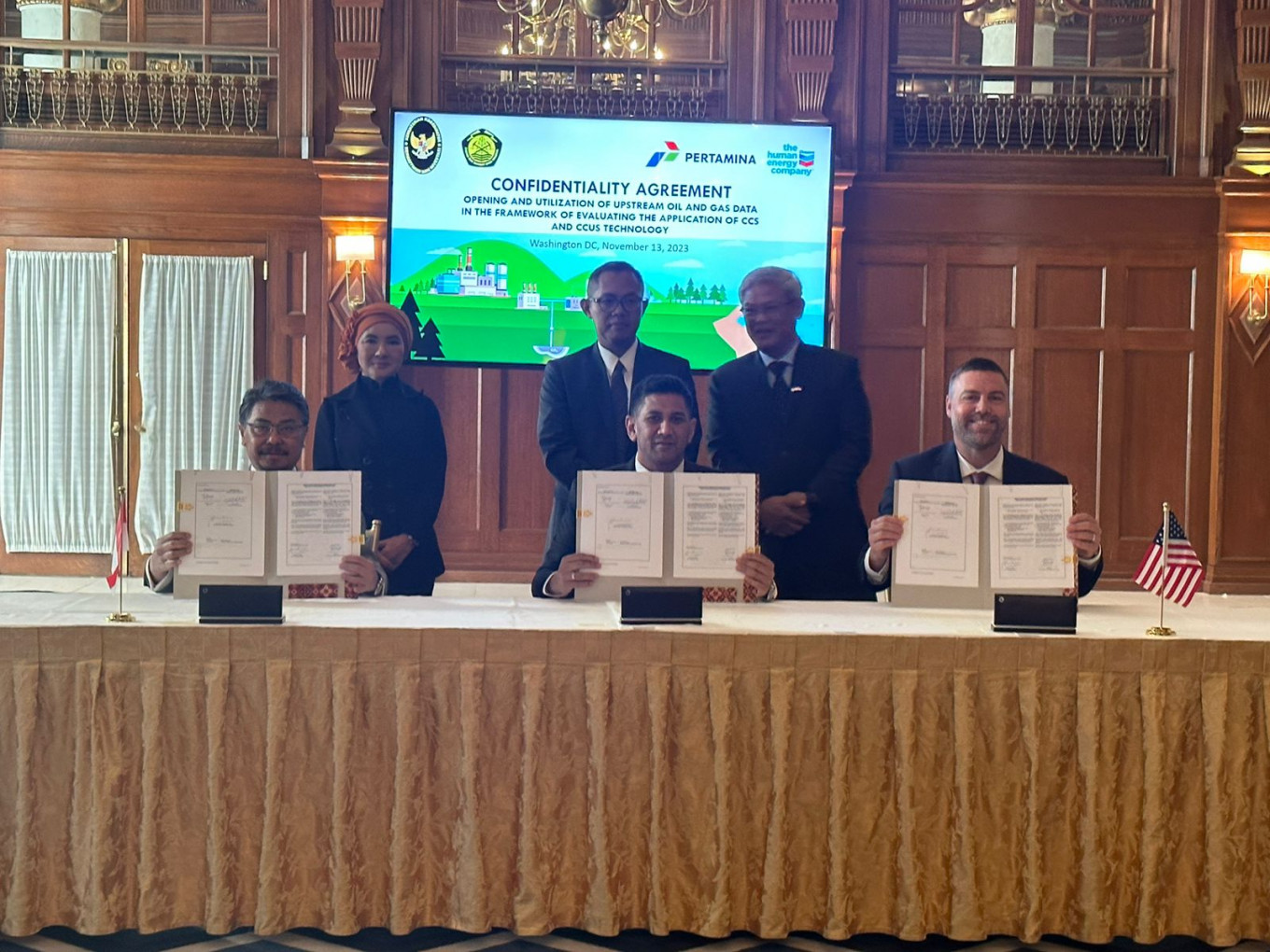Popular Reads
Top Results
Can't find what you're looking for?
View all search resultsPopular Reads
Top Results
Can't find what you're looking for?
View all search resultsCarbon utilization commitment: Pertamina, Chevron establish collaboration
Change text size
Gift Premium Articles
to Anyone
A
s a manifestation of commitment to the implementation of carbon capture, storage and utilization technologies, PT Pertamina (Persero) and Chevron have established collaboration in the field of decarbonization, namely for the development of Carbon Capture Storage or Carbon Capture Utilization and Storage (CCS/CCUS).
This collaboration is manifested in the execution of a Joint Study Agreement (JSA) between the two companies to assess the feasibility of CCS/CCUS in East Kalimantan. Pertamina and Chevron have agreed to mutually share information on regions and the potential development of CCS/CCUS. This includes geological and geophysical data, maps, models and interpretations, notes, summaries and commercial information.
This agreement has been realized through the signing of three Confidentiality Agreements on CCS/CCUS between the upstream sector subsidiaries of Pertamina, namely PT Pertamina Hulu Mahakam, PT Pertamina Hulu Sanga-Sanga and PT Pertamina Hulu Kalimantan Timur, and Chevron Energy International Pte. Ltd.
The agreement was a follow-up to the JSA between PT Pertamina (Persero) and Chevron Energy International Pte. Ltd, which has been in effect since March 6 of this year. In fact, exploration and collaboration between the two parties has been underway since 2022.
The signing was conducted by John Anis, the director of PT Pertamina Hulu Mahakam, PT Pertamina Hulu Sanga-Sanga and PT Pertamina Hulu Kalimantan Timur, along with Chevron New Energies authorized representative Jason Ashurst and technical and environmental oil and gas director Mirza Mahendra on Monday in Washington, DC. The signing ceremony was also witnessed by Pertamina president director Nicke Widyawati, Deputy Coordinating Maritime Affairs and Investment Minister Jodi Mahardi and Chevron Indonesia country manager Wahyu Budiarto.
Pertamina president director Nicke Widyawati said Pertamina was fully committed to developing low-carbon businesses through CCS/CCUS projects. This step was a key element in accelerating decarbonization, and the implementation of CCS/CCUS technology was part of Pertamina's efforts to adapt to the energy transition, he added.
“The CCS/CCUS project is highly strategic because of Indonesia's significant carbon storage potential. This gives Indonesia great potential to become a CCS hub or a center for carbon capture and storage in Southeast Asia,” Nicke said.
According to Nicke, current efforts in carbon utilization are also relevant to the utilization of oil and natural gas which will be needed until net-zero emissions (NZE) are reached by 2060.
“The use of fossil energy in Indonesia is still dominant, meaning we still produce significant emissions. Therefore, it is important to take CCS/CCUS technology seriously,” Nicke said.
Pertamina has collaborated with Chevron in the development of the CCS Hub project in East Kalimantan, which integrates emission-producing areas in the Balikpapan and Bontang Industrial Clusters.
Pertamina, as a leading company in the field of energy transition, is committed to supporting the goal of NZE 2060 by continuously promoting programs that directly contribute to the achievement of the Sustainable Development Goals (SDGs). All these efforts align with the implementation of Environmental, Social & Governance (ESG) principles across all of Pertamina’s lines of business and operations.










